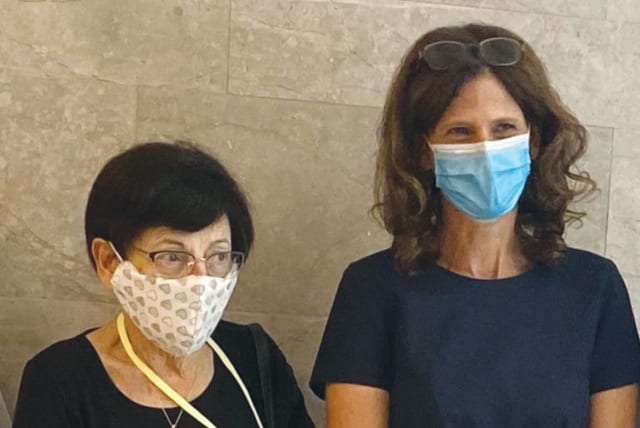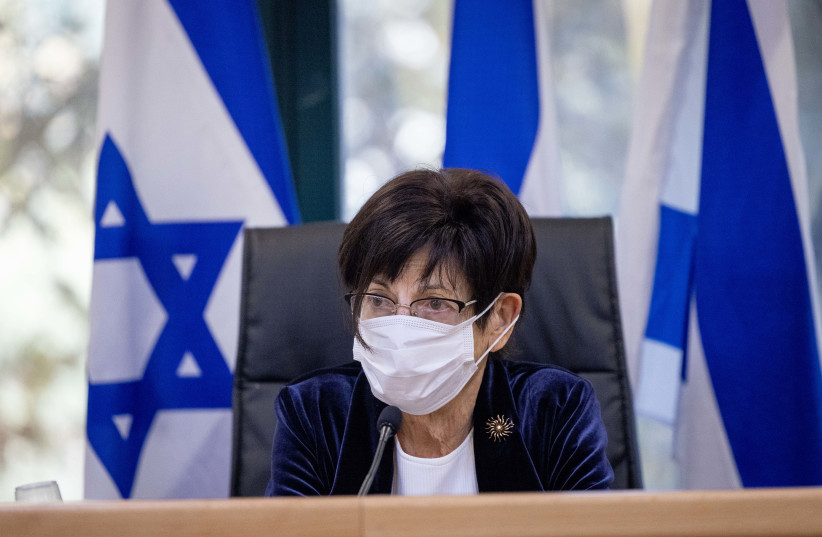Miriam Naor: Part Jewish mother, part judicial mensch - opinion

Characteristically diligent, she served even in her final hours, sitting late into the night, as Head of the State Commission investigating the Meron tragedy.
I owe the inspiration for this headline to Canadian Supreme Court justice (Ret.) Rosalie Abella, who permitted me to borrow her always poignant and moving words, in which she responded to my update sharing the sudden, sad news.
Miriam Naor, retired president and Supreme Court justice; justice in the magistrates’ and district courts; brave and industrious public prosecutor; daughter, sister, wife, mother and devoted grandmother; my beloved teacher and friend, accompanied my life’s journey in its various stages and contexts. Her mother-in-law, the late Esther Raziel-Naor, an educator, leader and warrior, was, for my mother Ariela Ze’evi, a mentor and friend in the days of Herut, Gahal and ultimately Likud. I was privileged to be a frequent guest in a home, an ecosystem, embodying the dignity, pride and love of people and country. Together with her husband, Prof. Arie Naor, a deep family friendship and long-standing appreciation flourished. My father, Prof. Irwin Cotler, naturally joined becoming a dear and esteemed friend and colleague. Thus, my relationship with justice Naor was molded on the basis of my family story intertwined with hers, as part of the story of Israel and the Jewish people.
In my second year studying law at the Hebrew University, Justice Naor accepted me as an intern in the Jerusalem District Court, despite my young age and limited experience, with the promise that my studies would not suffer. At a time of turbulent trials and tribulations that captured the public eye and garnered media attention, she steered the ship with calm resolute, alongside uncompromising professionalism, thoroughness, integrity and modesty. Sifting through boxes of legal materials and random documents, I marveled at her singular ability to identify the ‘needle in a haystack,’ pinpointing the questions essential to exposing truth.
Drowning out background noises, I learned from her unwavering commitment to justice, independence without arrogance, and clarity of thought and conduct. I absorbed her deep appreciation and respect for the three branches of government, and for the natural tension and concern for the delicate balance between them. I observed her remarkable character traits and manner of interaction, which enabled her to generate and maintain mutual trust and respect, even with those who profoundly disagreed with her.
Above all and for many years, Justice Naor was a dear friend and confidante, who always spoke her mind honestly, with affection and respect. A deep sadness struck also because of the sheer surprise, as our correspondence and conversations were very frequent. So detached from reality was the first headline reporting of her death, that I instinctively called her in order to consult how to best remedy the absurd mistake. Only with the sound of her daughter-in-law’s sad voice, did I comprehend that the news was indeed true.

Characteristically diligent, she served even in her final hours, sitting late into the night, as Head of the State Commission investigating the Meron tragedy. When asked to return to public service for this awesome task, I expressed my regret that her time would once again not be her own. In typical sincerity and clarity, she responded: “Michali, I have been called to reserves. It is my duty to report.”
With the establishment of the commission, I expressed my concern that the families of 8 of the 45 who perished, who came to Israel especially to celebrate in Meron, reflecting their deep commitment to Jewish identity and the State of Israel. I asked her to consider ways in which they would be included in the process, and ultimately, in its findings. In her always attentive, respectful, infinite humanity, the implementation was immediate. The families of those who perished in the disaster all received the commission’s engagement letter, and the interim report published recently was simultaneously translated into English, rendering it accessible, acknowledging responsibility, ensuring transparency and accountability.
“My Judge,” as I insisted to continue referring to her, accompanied me throughout my legal, professional, personal journey. She was an incredible sounding board in the difficult deliberations that accompanied four election campaigns and uncertainty and a partner in the decisions on how to best serve the Israeli public and Jewish people from the Knesset. In a roller-coaster reality, she was a stable, constant voice of reason, attentive and inquisitive, always making time to listen, ask, read, reflect and advise. I was deeply moved when she honored me with her presence in my inaugural speech from the Knesset podium, after exchanging her day with the grandchildren in order to be there, proud and engaged.
My confidante and wise friend continued to accompany deliberations and support my candidacy for the Jewish Agency chair. She followed the process closely and found the time and attention span to take an interest, initiate and advise. Following many years of in-depth discussions on the knowledge and insights gained, she expressed profound appreciation for my “well-formulated ideas,” inviting me to present at a forum she led on Jewish peoplehood and continuity. We shared concerns and commitment to the State of Israel and the Jewish people, recognizing the responsibility of our generation to pour content into the mission and values of the Jewish and democratic State of Israel, nation-state of the Jewish people, in the spirit of the Declaration of Independence and the vision of Israel’s prophets.
Coupled with her incredible abilities as a “Judicial mensch,” I will forever treasure the “Jewish mother” she was. On long days and nights, seated on opposite sides of a long table in her chambers in the district court, she comforted my young broken heart. Over the course of many years, she shed light and shared insights, words of encouragement and expectation for important milestones in my life. Small tales of enormous humanity testified to her greatness and modesty. When she invited my growing family to visit her office on Hanukkah, it seemed trivial to her that she, president of the Supreme Court, would stop by a neighborhood bakery in the early morning on her way to work, to pick out sufganiyot for each of my four children, hoping they would enjoy her choices. I cherish her always respectful treatment of every person equally, at all times, from the guards who escorted her to Shabbat meals, to global leaders.
The heart aches at the untimely passing of Justice Naor: part Jewish mother, part judicial mensch. The head refuses to accept the vacuum that her absence has created, for all who loved her, for Israeli society and the Jewish people. Like many of her disciples, friends and colleagues, I loved and will miss “my judge” so very much. Like many of her disciples, friends and colleagues, I will cherish her tremendous legacy, knowing that the compass she was and the clarity of her voice will continue to guide, echo and resonate.
My deepest condolences to her family who she loved so much and of whom she was so proud.
The writer is a public policy & strategy adviser, and candidate for chairperson of the Jewish Agency. She was a member of the 23rd Knesset.
